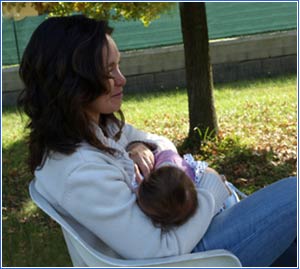Postpartum Interventions
At postpartum visits with the mother, focus on the following:
- Promote breast feeding
- Children who are breast fed are less likely to develop caries than those who are bottle fed, especially if there is ad lib use of bottles and sippy cups.
- Breastfeeding has multiple other proven health benefits.
- The American Academy of Pediatrics recommends that breastfeeding should be exclusive for the first 6 months of life and should continue to at least age 12 months or beyond, as desired by mother and child.

- Promote high dose xylitol gum or chlorhexidine rinse programs for mom until child is age two.
- Xylitol can help decrease transmission of caries causing bacteria from mom to child.
- If chlorhexidine is used, use only for brief periods of time (i.e. weeks) to reduce the risk of tooth staining.
- Ensure children are not put to bed with a bottle.
- Teeth are at highest risk overnight when saliva levels are low.
- Gently clean infants' gums and teeth after breastfeeding, then brush twice daily with a smear of fluoride toothpaste once teeth erupt (AAP and AAPD recommendation).
- Recommend children see a dentist at 12 months of age.
References
Gomez SS, Weber AA Effectiveness of a Caries Prevention Program in Pregnant Women and Mothers on Their Offspring. Int J Pediatric Dent 2001;11:117-122.
Guideline on Infant Oral Health Care. AAPD. Revised 2014.
Lynch H, Milgrom P. Xylitol and dental caries: An overview for clinicians. Journal of the California Dental Association. March 2003.
Salone LR, Vann WF, Dee DL. Breastfeeding : An overview of the oral and general health benefits. JADA 2013; 144(2):143-151.